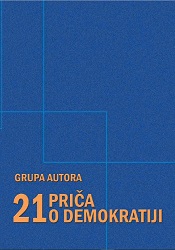Demokratija u tranziciji: ekonomske reforme u Crnoj Gori
Democracy in transition: economic reforms in Montenegro
Author(s): Nebojša Medojević
Subject(s): Politics, Economic policy, Government/Political systems
Published by: Centar za građansko obrazovanje (CGO)
Keywords: Montenegro; democracy; transition; economic reforms;
Summary/Abstract: Economic reforms in Montenegro have been implemented under strong ideological influence of the lobby from self proclaimed „new economic Montenegrin school“ from the Faculty of Economy in Podgorica in the past seven years. By simplifying of otherwise very complex transitional processes to vulgarity and by reducing them to dangerous myth about strength of market and magical effect of private property and needlessness of state and its laws and institutions, ideologists of those reforms are briskly turning Montenegro in devastated colony with the army of unemployed and poor citizens. Instead of „invisible hand of market“ we are constantly directed to by the members of this clan, we got „visible hand of crime, corruption and poverty“. At the same time system mistake has been made: the care necessary to this weak market and new institutions has been neglected. This care can only come from political and wider social context, by establishing necessary level of thrust between the citizens and reformatory elite. Experiences connected to reforms in other countries show that choice of model is not so important for their success, but established thrust of citizens in reformatory elite and their resolution to continue walking courageously on this path till the end. Reformatory elite must be maximally devoted to general interests, fair and professional and should not endanger the thrust of citizens by any action. In analysing the causes of economic and social crises in Montenegro, one has to take into consideration forming of the parallel system of power with organised crime and corruption, which are seriously endangering Montenegrin society. The fact that the foundation of the new Montenegrin economy has arisen from brutal theft of former socialists’ social property, and that privatization and reform process has, anent to corruption, created quasi-market structures did not trigger attention of the domestic and international politicians and analyst. And exactly organised crime and corruption are the main obstacles for arrival of foreign investments and economic convalescence of the country. Devastated institutions of the system are not capable of guaranteeing the security of the contracts, non-discriminatory appliance of the law, rights of stockholders, reimbursement of claims, nor physical safety and protection from criminal cartels. The citizens of Montenegro, political parties, but international community as well have to realize that Montenegro is not on the reform path, but on direct path towards economic, social and political catastrophe and total confinement and misuse of state functions by the criminal structures. In spite of verbal advocating of this political elite for „sovereign, fee, upright and independent state“ Montenegro, all that they are really doing on the reform plan is leading Montenegro further away from this goal. Independent or not, after these authorities, new generations of politicians will have to lead a hard battle for years so as to return the fundamental prerogatives of sovereignty to the state of Montenegro. In the century marked by the fight for control of energy, pure organic food and drinking water, these authorities are briskly ruining natural and manufactured strategic resources and putting them out of control of national institutions and politics and for that reason it is difficult to count on sustainable development. „New economic school“ is creating economy that will only deal with distribution and consumption. In time, when domestic products are gone, we will distribute only foreign ones, taking small percentage, until foreign manufacturers start distributing their own products themselves, and we become only consumers. While the reserves last.
Book: 21 priča o demokratiji
- Page Range: 183-193
- Page Count: 11
- Publication Year: 2005
- Language: Montenegrine
- Content File-PDF

